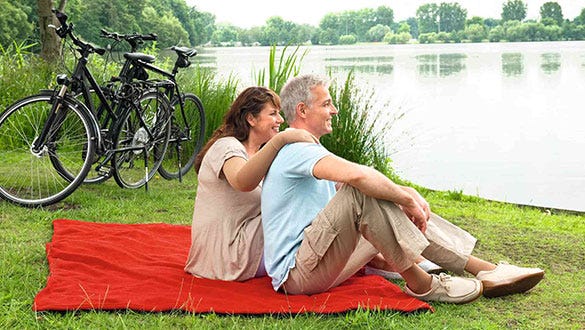- Free First Class Delivery
- Buyer Protection
- Secure Online Shopping
- Healthcare Professional? Click here
What should I eat for lipoedema and lymphoedema?


Categories
How to support your lipoedema and lymphoedema therapy with a healthy diet
When we eat healthily, we feel fitter, sleep better, and have more energy throughout the day. Lipoedema patients in particular should be careful to maintain or reduce their weight. They can benefit greatly from preventing obesity through a balanced diet. However, it is important to stress that having Lipoedema definitely doesn’t mean that you are obese, something that health care professionals all too frequently misdiagnose.
Studies show that approximately 50% people with lipoedema struggle with being overweight.* As a result, their symptoms worsen. This can lead to increased water retention and mental stress.
Dieting is not the right approach with lipoedema. Instead strive for a conscious, balanced diet or nutritional change to achieve realistic results.
In addition to the five main pillars of CPD (Complex Physical Decongestion Therapy): Manual Lymph Drainage, Compression Therapy, Exercise, Skin Care, Self-Management, proper nutrition plays a very important role in supporting therapeutic success.
I have lipoedema - can I lose weight if I change my diet?
If you change your diet and become physically active, you can avoid or reduce the risk of becoming overweight. But this has little influence on the proliferation of fatty tissue on your extremities caused by lipoedema. Nevertheless, an adapted diet makes sense and can help to avoid secondary diseases related to being overweight.
Reduce lip- and lymphoedema complaints with a healthy and balanced diet
Patients can reduce their discomfort and pain by up to 80 percent with a long-term dietary change. This was demonstrated by a study at the Centre for Vascular Medicine in Hamburg with obese lipoedema and lymphedema patients. In addition, less therapy was needed.**




Indulge healthily: Tips for a healthy and balanced diet
A healthy and varied diet as well as sufficient liquid intake support positive therapy effects whilst counteracting possible complications.
- Fruit and vegetables: Brightly coloured fresh fruit and vegetables provide you with all the important substances and minerals your body needs. Don’t forget your “5-a-day” – preferably two portions of fruit and three portions of vegetables. Large portions of vegetables can be consumed because, unlike fruit, they do not affect blood sugar levels and keep you feeling fuller for longer.
- Healthy fats: Fat is not always bad. Linseed oil, seeds, avocados and nuts are very important to the body and contain good fats. Try and avoid baked goods, margarine and sunflower oil as these tend to be “bad fats”.
- Meats and cheese: Reduce your consumption of meat, especially red meats, and cheese products.
Less salt: Do not eat a lot of salt because salt binds water in the tissue. - Breaks between meals: In a meal, a lot of energy is consumed and the body takes a while to expend this energy. This excess energy is stored in the body in the form of fat or glycogen, which is a carbohydrate. The body then draws on this between meals to keep your energy levels up. If you don’t take enough time between meals, you take in more energy than you need. This is then stored as fat deposits.
- Blood sugar levels: Avoid foods that raise blood sugar too quickly and cause a sugar rush/spike, which inevitably ends in a sugar drop/low. These can include ready meals, fizzy drinks, sweets, white flour foods, such as baguettes, rolls, toast, biscuits, and more.
- Drink enough: at 9 glasses of liquids such as water or unsweetened tea. Avoid sugary soft drinks and juices as they contain unnecessary calories. Try to limit your alcohol consumption.
- Keep moving: Exercise also helps you feel good in your own body and reduce stress levels. Walking in the fresh air is particularly suitable for de-cluttering your mind.
More information
*S1-Leitlinie Lipödem, AWMF Reg.-Nr. 037-012, Stand Oktober 2015. Online published on: http://www.awmf.org/leitlinien/detail/ll/037-012.html (Last accessed 03.05.2018).
**Faerber, G. Ernährungstherapie bei Lipödem und Adipositas – Ergebnisse eines leitliniengerechtes Therapiekonzepts. vasomed 2016;4:176-177. Online published on: www.der-niedergelassene-arzt.de/fileadmin/user_upload/zeitschriften/vasomed/Artikel_PDF/2017/04-2017/Faerber.pdf (Last accessed 03.05.2018).






